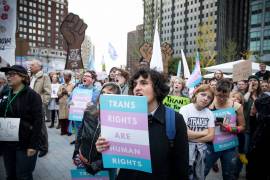
Why the Federal RFRA and Similar State Bills and Laws Threaten LGBT People and People Living with HIV
Blog Search
The following presentation was provided by Jennifer C. Pizer, Lambda Legal Law & Policy Project National Director, at a briefing convened by U.S. Rep. Bobby Scott on the harms of federal and state Religious Freedom and Restoration Acts (RFRA).
Thank you Representative Scott. It is an honor to be with you this morning. I and my colleagues at Lambda Legal greatly appreciate your leadership on the important issues we are discussing today, and also the interest of everyone here, and especially your interest in the impact on lesbian, gay, bisexual and transgender (“LGBT”) people and people living with HIV.
I will focus on how recent state legislative contests about so-called “religious freedom” bills have helped to reveal the extreme vulnerability of LGBT people and people with HIV. The outcry last year against Arizona’s SB 1062—a bill designed to permit businesses to turn away same-sex couples—and its veto by then-Governor Jan Brewer, began the education for many.
But, this spring, the outcry against the RFRA bills in Indiana (SB 101) and Arkansas (HB 1228) only prompted revisions and not vetoes. Both states now have new RFRA statutes.[1] And, despite the important constraints both legislatures adopted in response to public pressure, the vulnerability remains. In addition, the debate about whether these RFRAs are or are not “fixed” largely failed to address, let alone eliminate, the harms that continue even when there are applicable civil rights laws—none of which is justified by our commitment to religious freedom.
Let’s appreciate the context: As much of our country anticipates a Supreme Court decision soon affirming the constitutional right of all Americans to marry the person they love, regardless of sexual orientation, there has been a deluge of bills in about half of the states—approximately 100 bills by most counts—designed to allow business and other institutions, public employees and others, to treat married same-sex couples as unmarried based on religious beliefs. These bills usually fall into one of the following categories: (1) RFRAs; (2) marriage-related refusals; (3) refusal of child placement services; (4) access to health care services; (5) discrimination by student groups; (6) entitlement to government contracts, grants and other benefits despite discriminating; and (7) other anti-LGBT legislation. The ACLU has a webpage tracking these. If you look, you are likely to agree. It is a deluge. And it makes unmistakable the widespread, aggressive contempt for gay people that still permeates too much of our country. These are overt demands to enshrine explicit freedom to reject same-sex couples from places of public accommodation, housing and employment simply for being themselves. When these bills are enacted, they represent explicit invitations to discriminate.
This is a terribly serious problem for our community for multiple reasons, some of which are obvious but some are less so, if reporters’ questions are a guide. Here is a sketch.
First: In more than half of the states, LGBT people do not yet have the basic civil rights protections that should secure equal treatment for everyone. Research finds that many people mistakenly believe that broad protections for LGBT people already are in place in the states and in federal law. That is not the case. A similar problem is that many people are unaware of the pervasiveness of anti-LGBT discrimination and its devastating effects. The problem remains largely out of public view for at least two reasons.
One, the lack of legal rights means gay and transgender people often have no avenue for redress. They cannot file complaints, which means limited visibility and records of the problems.
Two, in a hostile climate without clear legal protections, many LGBT people do not object to unjust treatment. Instead, they keep their heads down and absorb the abuse, avoiding being more widely known as LGBT and perhaps a larger target. As a result, others remain unaware that their casually expressed disdain is wounding people they like and respect. This discrimination can have severe financial consequences as well as emotional and health consequences.
I highlight these realities because many legislators call for passage of state RFRAs saying enhanced religious rights are “needed” to ensure that businesses can refuse services to gay couples. The business owners want to be “protected” against these customers. In other words, these bills are preemptive “protections” for those wanting to use religion to discriminate against people who do not yet have the basic protections against discrimination everyone should have.
The process through which Indiana’s RFRA bill, SB 101, became law illustrates the problems and confusion about these laws, especially post-Hobby Lobby. Contrary to its supporters’ claims, SB 101 created more expansive religious refusal rights than the federal RFRA because it vested all commercial enterprises with religious rights, going beyond even the Supreme Court’s improper expansion of the federal RFRA in Hobby Lobby, which allows closely held, for-profit businesses to assert religious rights and opened a Pandora’s Box of problems.
But, Justice Alito’s majority opinion in Hobby Lobby said his analysis is not a shield for discrimination. Justice Kennedy’s concurrence makes that point more broadly. So why do we worry? We worry in part because Justice Alito spoke repeatedly and specifically of race discrimination and did not join Justice Kennedy’s more broadly written treatment of this point, despite Justice Ginsburg’s dissent calling out risks of discrimination on other grounds, including sexual orientation. We also worry because it is not yet authoritatively established in federal law that laws banning sexual orientation discrimination serve the same compelling interests as other nondiscrimination laws. We believe that clearly is the correct answer legally, however, others disagree.
There also is concern due to Justice Alito’s statement that women will experience “zero” impact if their health needs are treated differently from men’s, as long as women can obtain what they need from an alternate source. That sounds disturbingly like what we hear in defense of businesses that refuse wedding-related services, but insist there is no harm from that rejection if same-sex couples can obtain acceptable goods elsewhere. This approach misses a key purpose of all equal rights laws—to protect each of us from the humiliation and stigma of being refused services based on who we are, because a business objects to serving “our kind.”
Some proponents of the Indiana RFRA said it was “needed” to ensure that businesses that turn away gay people cannot be held liable, while others said it was not about discrimination. But any doubt about its purpose was removed when numerous amendments were offered to preclude use of the religious rights to defend against civil rights claims, and each was rejected.
Public pressure then did convince state leaders to amend the law, which many hailed as a great victory. But, when adding the civil rights “carve out”, the lawmakers refused the simple, brief language that would have added civil rights for LGBT people to Indiana law. True, there are important local protections and the carve-out secures them. But local laws are more limited, and much of Indiana lacks even those.
What has received less attention is the threats that remain due to Indiana’s RFRA, as with the federal law and similar state laws. For example, civil rights laws often are deemed not to apply when goods or services are refused to everyone, not just to a particular group; and this too often holds true even when only a disempowered group needs those goods or services. So when pharmacists object on religious grounds to filling prescriptions for contraceptives to reduce risk of cancer, to manage debilitating pain, or to avoid high risk pregnancy, or when they object to HIV medications or to care related to gender transition, exceedingly vulnerable people are made to bear unfair health risks, stress and the humiliation of being rejected by health professionals based on others’ religious beliefs.
Further, the amendment of Indiana’s RFRA only applies to private businesses, leaving religiously affiliated hospitals, hospices and other agencies free to discriminate against married same-sex couples, individual LGBT patients, women, people living with HIV, and anyone else whose medical needs may not match the beliefs of the agency.
Freedom of religion always and rightly has been a core American value. Yet, the federal law and the laws of many states remain badly out of balance because LGBT people remain legally vulnerable in so much of our country, and many others remain at risk due to imposition of others’ religious beliefs. It is time to enact comprehensive protections for gay and transgender people and to amend federal RFRA and the similar laws of many states to ensure that religious rights may not be used unfairly to harm others.




